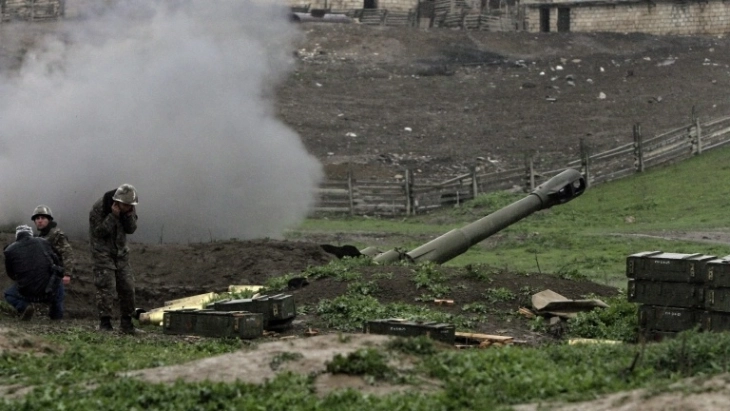Azerbaijan, Armenia lose around 50 soldiers each in most recent clash

Moscow/Istanbul, 13 September 2022 (dpa/MIA) - Azerbaijan and Armenia have both lost around 50 soldiers each in the latest outbreak of heavy fighting between the rival Caucasus neighbours.
Military sources in Azerbaijan said their forces suffered 50 deaths. The Azerbaijani Defence Ministry said the death toll includes 42 army soldiers and eight border guards. Armenia had earlier reported 49 deaths.
But Armenian Prime Minister Nikol Pashinyan said that his country's figures were not yet final.
The fighting between the hostile ex-Soviet republics began at night and continued sporadically during the day. Towards evening, the artillery fire calmed down somewhat, the Armenian Defence Ministry said.
Yerevan reported that Azerbaijani troops attacked Armenian positions with artillery and large-calibre weapons at three locations. Azerbaijan's Defence Ministry said that the fighting had been triggered by a large-scale Armenian sabotage attempt.
Nagorno-Karabakh is at the heart of the decades-long dispute between Armenia and Azerbaijan. However, according to Armenia, the latest attacks targeted positions in Armenia, not in the contested region.
"The entire responsibility for the situation lies with the military-political leadership of Armenia," the ministry in Baku said.
Pashinyan spoke with Russian President Vladimir Putin on Monday and the two agreed to remain in contact, Armenia's government said. Russia has previously brokered ceasefires between Armenia and Azerbaijan and is traditionally considered Armenia's protective power in the Caucasus.
The Kremlin said Moscow was counting on a diplomatic solution to the crisis. At present, the Russian leadership has no interest in becoming militarily involved in what it sees as a sideshow. Russia is tied up because of the war in Ukraine.
Putin did participate in a videoconference of representatives of former Soviet states to discuss the fighting.
Iran, the Organization for Security and Co-operation in Europe (OSCE), the EU, the United Nations and the US intervened and urged an end to the fighting. On Wednesday, the UN Security Council in New York will deal with the conflict between the two ex-Soviet republics, the Russian agency TASS reported, citing UN sources.
Media in Yerevan also reported that Pashinyan had updated French President Emmanuel Macron about the situation.
Armenia "should cease its provocations" and focus on peace negotiations with Azerbaijan, Turkish Foreign Minister Mevlüt Çavuşoğlu said on Tuesday.
"Discussed Armenian provocations on the Azerbaijan-Armenia state border with my brother foreign minister of Azerbaijan," Çavuşoğlu wrote on Twitter, referring to Jeyhun Bayramov.
Bayramov separately said he had informed Çavuşoğlu in a phone call "about recent large-scale military provocations by Armenia."
The two ministers emphasized "the importance of implementation of undertaken obligations and stopping aggression by Armenia," Bayramov added on Twitter.
Turkey backed predominantly Muslim and Turkic Azerbaijan in its 2020 military campaign to recapture large parts of disputed Nagorno-Karabakh.
Armenia and Azerbaijan have been locked in conflict for decades about Nagorno-Karabakh, which has historically had a majority Armenian population, but was legally part of Azerbaijan under Soviet rule.
Following the collapse of the Soviet Union, Nagorno-Karabakh claimed independence from Baku as the Republic of Artsakh, backed by Yerevan, sparking a three-year war.
The war ended in 1994, with Armenia victorious, and Nagorno-Karabkah was for a quarter of a century under effective Armenian control, though its status was never internationally recognized.
After decades of stalemate, Azerbaijan suddenly recaptured large parts of Nagorno-Karabakh in a 2020 military campaign, forcing Armenia to make major territorial concessions. These included a stipulation limiting Armenian access to the region to one safe corridor monitored by Russian peacekeepers.
The ceasefire has been broken several times by both times since then, however.







